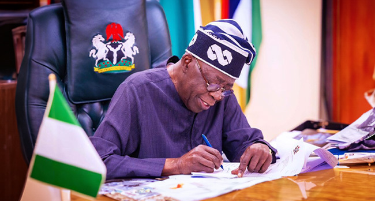President Bola Tinubu has approved the appointment of several individuals to the Board of the Nigerian Consumer Credit Corporation (CREDICORP). This strategic move is designed to “further expedite the process of expanding consumer credit access to Nigerians,” according to a statement released on Wednesday by presidential spokesman Ajuri Ngelale.
The newly appointed board members bring a wealth of experience and expertise to CREDICORP, an institution pivotal to improving consumer credit availability in Nigeria. Their roles and responsibilities are critical to ensuring that more Nigerians have access to credit facilities, which can significantly boost economic activities and improve living standards.
The appointees are as follows:
1. Otunba Aderemi Abdul – Board Chairman (Independent Non-Executive Director): Otunba Aderemi Abdul will lead the board with his extensive experience in financial management and corporate governance. His role as an independent non-executive director ensures that he will bring an unbiased perspective to the board’s decisions and strategies.
2. Engr. Uzoma Nwagba – Managing Director/Chief Executive Officer: Engr. Nwagba, with his robust background in engineering and management, will steer the corporation’s day-to-day operations. His technical expertise and leadership skills are expected to drive CREDICORP’s mission of facilitating consumer credit access.
3. Mrs. Aisha Abdullahi – Executive Director (Credit, Risk & Portfolio)/CRO: Mrs. Abdullahi’s extensive experience in credit management and risk assessment positions her well to oversee the corporation’s credit portfolio. She will be responsible for managing risks and ensuring that credit facilities are distributed prudently and effectively.
4. Ms. Olanike Kolawole – Executive Director (Operations)/COO: Ms. Kolawole will manage the operational aspects of CREDICORP. Her role will be crucial in streamlining processes and ensuring that the corporation operates efficiently to meet its objectives.
5. Dr. Armstrong Ume Takang – Non-Executive Director (MOFI Nominee): As a nominee of the Ministry of Finance Incorporated (MOFI), Dr. Takang will bring insights from the finance ministry to the board, aiding in aligning CREDICORP’s strategies with national financial policies.
6. Dr. Peter Iwegbu – Non-Executive Director (NIMC Nominee): Dr. Iwegbu, representing the National Identity Management Commission (NIMC), will contribute to integrating national identity management frameworks with CREDICORP’s credit systems, ensuring that credit access is secure and identity-verified.
7. Mr. Mohammed Nasiru Abbas – Non-Executive Director (FMITI Nominee): As a representative of the Federal Ministry of Industry, Trade and Investment (FMITI), Mr. Abbas will help align CREDICORP’s initiatives with broader economic development strategies and industrial policies.
8. Mr. Marvin Nadah – Non-Executive Director (FCCPC Nominee): Representing the Federal Competition and Consumer Protection Commission (FCCPC), Mr. Nadah will ensure that consumer protection principles are upheld in all of CREDICORP’s operations, promoting fair credit practices.
9. FMF Representative – Non-Executive Director (FMF): The representative from the Federal Ministry of Finance will provide crucial oversight and ensure that CREDICORP’s financial operations align with national fiscal policies and objectives.
 In his statement, Ajuri Ngelale emphasized the President’s expectations for the new board members to leverage their vast experience, competence, and dedication to achieve CREDICORP’s mandate. “The President expects the new members of the Board of this pivotal institutional vehicle to bring their vast experience, competence, and dedication to bear in their functions to achieve CREDICORP’s mandate of accelerating access to consumer credit to millions of Nigerians,” the statement concluded.
In his statement, Ajuri Ngelale emphasized the President’s expectations for the new board members to leverage their vast experience, competence, and dedication to achieve CREDICORP’s mandate. “The President expects the new members of the Board of this pivotal institutional vehicle to bring their vast experience, competence, and dedication to bear in their functions to achieve CREDICORP’s mandate of accelerating access to consumer credit to millions of Nigerians,” the statement concluded.
These appointments are seen as a significant step towards enhancing consumer credit infrastructure in Nigeria. By improving access to credit, the government aims to empower individuals and small businesses, stimulate economic growth, and enhance the overall financial inclusion landscape in the country. The board’s diverse composition, including representatives from key financial and regulatory institutions, underscores a holistic approach to achieving these goals.




